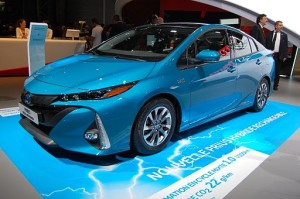 Toyota has made quite a number of remarkable decisions over the past half year concerning its present, as well as future vehicle technologies. After opposing the battery-electric cars for several years, the automaker has finally made a commitment to launch one by the year 2020. Now, Toyota has made the decision to share its hybrid technology with other automakers. This decision was announced in the last two weeks as a part of the company’s power train strategies. The move by the automaker marks an evident change of course.
Toyota has made quite a number of remarkable decisions over the past half year concerning its present, as well as future vehicle technologies. After opposing the battery-electric cars for several years, the automaker has finally made a commitment to launch one by the year 2020. Now, Toyota has made the decision to share its hybrid technology with other automakers. This decision was announced in the last two weeks as a part of the company’s power train strategies. The move by the automaker marks an evident change of course.
Since the launch of the Prius Hybrid in 1997 in Japan, the automaker has been known to fiercely guard and protect its hybrid-electric technology. A few licensing deals have been signed including one with Nissan for an Altima hybrid (2007-2011 models) that have been sold in the United States. Toyota also signed a deal with Mazda for the Mazda 3 compact hybrid that was sold solely in Japan. A notable aspect concerning those deals is that they were not only limited, but also fairly low-volume. According to the description given in a report by Reuters, Toyota has a plan of working with the suppliers at an early stage to allow standardization of components and make it easy for other automakers to utilize its hybrid technology.
The fourth generation of Toyota Prius was launched last year. The car’s drive is considerably better, while its fuel-efficiency is also better compared to the previous versions. Unfortunately, the sales seem to have lagged, probably due to factors such as continued cheap gasoline, a change in consumer preferences, and the model’s extreme styling. Toyota also made a shocking decision in its 2017’s Prius Prime, which is the most recent plug-in hybrid. The latest technology defaults the vehicle to run only in the electric mode when the battery charge is still present. This is contrary to a majority of other plug-in hybrid cars except the Chevrolet Volt.
There has been an increased understanding of the advantages of fully-electric propulsion by Toyota. The strategy of sharing the hybrid technology would be of a long-term nature. Changes will be made to technical standards and parts specifications, with most of them being invisible to buyers. The suppliers of Toyota have been known to produce technology that can only be utilized by Toyota. As the simple battery-electric cars gradually gain market popularity, they have a high likelihood of surpassing the continually low market penetration of hybrid cars. Either way, consumers should get ready for more hybrid cars utilizing the Toyota technology. The company is trying to match up to its competitors including Tesla and General Motors.